https://orthosphere.wordpress.com/2020/05/26/nietzsche-the-diabolical-saint-of-acceptance/
Friedrich Nietzsche is a strange mixture of conflicting impulses; so
chronically sick that writing was a physical agony for his eyes and his
stomach permanently bothered him, yet he wrote paeans to the strong and
mighty. A brilliant analyst of resentment, he had every reason to feel
ignored being unread during his lifetime and self-publishing books that
he mostly could not sell. He admired Dostoevsky, which itself is
admirable, writing in
Twilight of the Idols that Dostoevsky was the only psychologist from whom he had anything to learn. Nietzsche first stumbled upon Dostoevsky’s
Notes from Underground in a bookstore in Nice in the winter of 1886-87 and immediately loved it, though Dostoevsky never knew of Nietzsche.
Notes from Underground is
psychologically and anthropologically penetrating, exploring themes of
mimesis and resentment that were of immense interest to Nietzsche.
Unlike Dostoevsky, there is something perennially adolescent about
Nietzsche, perhaps because young adults are often trying to decide what
values they should hold, often temporarily in contradiction to their
parents, as they prepare to make their way in the world on their own.
Nietzsche’s “transvaluation of values” fits this model nicely. There
used to be a certain kind of young man magnetically drawn to Nietzsche’s
mixture of cleverness, perversity, sense that he had a secret
understanding of things, and man alone and against the world demeanor,
and perhaps there still is.
God is ultimately the source of all value. It is because we are made in the image of God
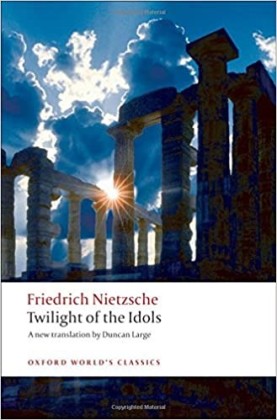
and
are thus connected with eternity, God, and Freedom that the Person has
supreme intrinsic value. There simply is no way around this fact.
Nietzsche, on the other hand, is famous for the notion that God is dead.
This is usually understood to mean that God is dead as a cultural
phenomenon; that all the smart people have become atheists. René Girard
argues in
Dionysus Versus the Crucified, however, that this is a
misunderstanding and that the truth is far more complicated. Nietzsche
rejected Christianity in favor of a return to pagan religion and
Dionysus. Dionysus is a trickster god who stirs up trouble, encourages
his own murder by challenging the social hierarchy, only to magically
reappear unharmed afterwards. This is because Dionysus represents the
scapegoat who is falsely blamed for generating a complete social
breakdown in a way that only a god could achieve, who is then murdered,
bringing the community together in shared hatred, unanimity minus one,
and is then credited with creating widespread peace, again in a god-like
manner.
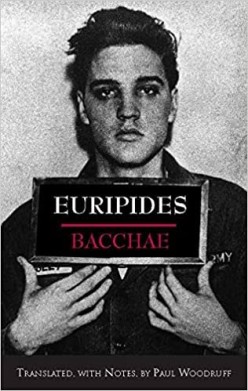 The Bacchae
The Bacchae
by Euripides, “Bacchus” being another name for Dionysus, depicts the
threatening, implacable, and undefeatable nature of the scapegoating
dynamic. Dionysus, a long-haired beautiful and effeminate youth, has a
reputation for stirring up the Bacchae, the female followers of Bacchus,
into a mad murderous frenzy that would likely include wild drinking.
Pentheus, the king of Thebes, wants nothing to do with Dionysus and
tries to eject him from the city but, failing that, ends up imprisoning
him. Dionysus warns Pentheus that he will be sorry for interfering with a
god, an earthquake sets Dionysus free from his prison, and everything
goes to hell for Pentheus who loses his head, literally, at the hands of
his own mother who has become one of the bacchants.
Nietzsche rejects the Christian God of compassion, and opts for the
pre-Christian Dionysus who is killed and then revives. God is dead, long
live God. Dionysus dies that we may be saved over and over again. The
strong murder the weak; and the mob are always stronger than the
individual, as Socrates points out in
The Gorgias, much to the
disgust of Callicles. Nietzsche sides with Callicles in praising the
strong, but his position suffers from the same defect. The many, the
rabble, can beat the few. Nietzsche then finds himself in the ludicrous
situation of defending the strong against the weak, a logically and
rhetorically contradictory position. In Christianity, as Nietzsche sees
it, the slaves have risen up against their masters and denounced
brutality, praising forgiveness and compassion, tricking the strong, the
masters, into feeling guilty for callously mistreating their social
inferiors. Nietzsche is correct that the weak are prone to

resentment,
that unlovely emotion and attitude, but it is better than the strong’s
treatment of the weak. Repressed violence is better than violence
expressed.
Unlike many nineteenth century anthropologists and critics who
equated the savior aspect of Dionysus and other sacrificial religions
with Jesus’ death, Nietzsche recognized that Dionysus is the antithesis
of the Crucified. The immolation of Jesus reveals the scapegoat
mechanism because he is recognized as an innocent victim murdered at the
hands of the mob. Up until then, this habit of murdering the scapegoat
went unnoticed partly because the victim was not alive to complain about
his unjust treatment. With Jesus, the disciples were steadfast in
maintaining Christ’s innocence with supernatural courage, since
defending the scapegoat puts someone at odds with the mob who are likely
to treat him with the same rough justice they meted out to the victim.
So, Nietzsche had enough insight to recognize what made Jesus different.
 Thus Spake Zarathustra
Thus Spake Zarathustra
is where Nietzsche announces the death of God and has the prophet claim
that we have murdered him with our bloody knives. Girard points out
that this is simply not taken seriously by many critics who imagine that
he is referring to the Christian God and that the reference to knives
is strictly metaphorical. But it is Dionysus the god, the scapegoat
victim, that we kill with our knives whereupon he is resurrected as
immortal savior, to begin the process all over again.
Nietzsche wants a transvaluation of all values, but since the
Christian God is the source of all values and Nietzsche is an atheist,
he is unable to generate value at all. What he calls “master” morality
in
The Genealogy of Morals is the absence of morality. It is in
line with Callicles’ description of the strong who simply take what
they want. Here Callicles uses the demi-god Heracles (Hercules in Latin)
as his example, swooping in to take another man’s cattle. The fact that
Heracles is half-god is relevant. Heracles, the man who murdered his
whole family and thus is the arch-villain scapegoat victim, also plays
savior as the most heroic of all Greek heroes. One thing Nietzsche
claims to like about the “masters” is that they do not hate or resent
anyone. They have no envy and anyone below them socially is unworthy of
their attention. They have eyes only for their social equals with whom
they might compete, but who they also respect. The weak are simply
beneath contempt.
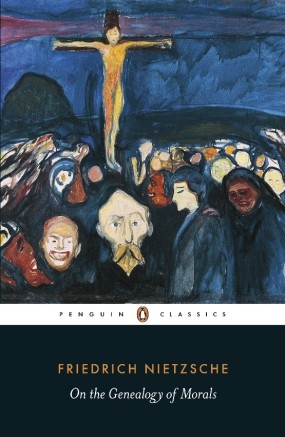
Nietzsche is concerned that Christianity and the morality of his time
were a kind of cult of equality and thus mediocrity. Rather than
admiring the cultural high achievers, like himself perhaps, Nietzsche
worried that it was the meek, the humble, and most of all, the
innocuous, who were esteemed. Many of Nietzsche’s criticisms of
Christianity are really attacks on the Christianity of his time which
had many unappealing features. He certainly was not a fan of boring
bourgeois sentimentality or the idea of eternal damnation. The
difficulty is that there is no way to get value from a Godless,
naturalistic, view of reality. So Nietzsche is reduced to impotency. He
wants an alternative to values derived from theism, but is noticeably
and initially perplexingly unenthusiastic about “master” morality. His
heart was not in it. Mastery morality seems to play the role of a
place-filler until he can come up with something better, but of course,
he never does and he just flails around.
Nietzsche rejects the boring, mediocre, and banal aspects of the
morality and religion of his time, but then he accepts the equally
boring and banal aspects of scientifically inspired metaphysics,
naturalism, also popular in his era. This is a total failure of
imagination. But it also represents a genuine dichotomy. Once a belief
in the Kingdom of God, of heaven, the transcendent, and the divine is
abandoned, what is left is mere physical reality, and physical reality
as a sequence of events is deterministic and thus meaningless and
unlovable. It is only when some of those events point back to their
origins in the spiritual realm of subjectivity, and thus agents, that
determinism can be escaped.
What Nietzsche needed to do was to criticize socially-derived
malformations of Christianity and replace them with a more genuine
Christian vision. This can be difficult because science and religion as
social phenomena have the great mass,
Das Man, backing them up.
This creates orthodoxy and makes of the free thinker a heretic.
Nietzsche’s acquiescence to many scientific tropes is surprising given
his iconoclastic attitude to religion. Clearly religion and myth
inspired his imagination more than science did. Dostoevsky’s character
Ivan in
The Brothers Karamazov at least criticizes a very
sophisticated version of Christianity and attacks it well, despite
Dostoevsky’s pro-Christian sentiments.
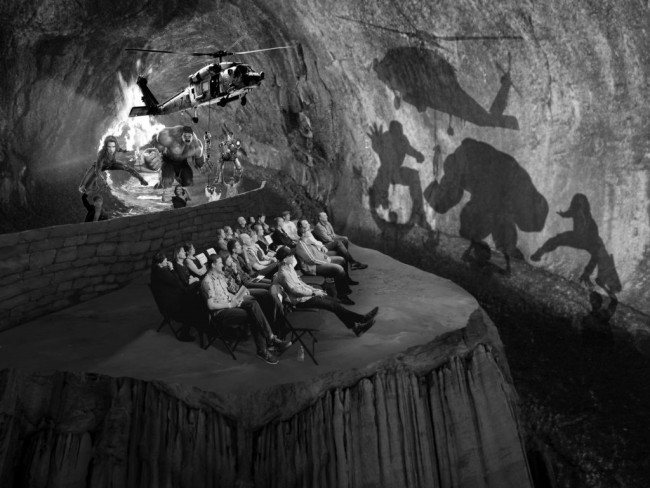
To understand what is going wrong with Nietzsche’s thought it is
necessary to understand Ken Wilber’s argument that the proper
existential stance requires both wisdom and compassion, Eros and Agape,
symbolized by the allegory of Plato’s Cave. In leaving the cave, the
philosopher, the lover of wisdom, is searching for wisdom, salvation,
God, the Good, and happiness. For Plato, happiness requires wisdom
because it is necessary to learn the difference between what is truly
desirable and what is not. Part of man’s destiny is to develop. Misery
and suffering will lead to wanting to overcome the problems and
limitations that cause these things. The quest to understand the Good
better is everyone’s life long goal, whether they know it or not.
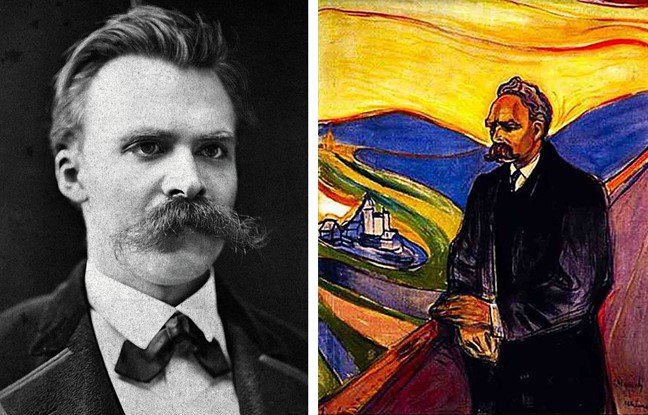
So, to care about yourself and for other people, it is necessary to
strive to develop and to wish them to do so as well. To wish anyone to
stop developing at any age is to wish him ill. The interests and
limitations of a ten year old are fine when he is ten, but ridiculous
when he is fifteen. But a proper existential stance also requires
compassion. Compassion is acceptance; unconditional love symbolized by
returning to the cave out of concern for the philosopher’s fellow
prisoners.
Wilber calls the quest for development and improvement “Eros,”
related to the love man has for God, and equates it with a more
masculine-style conditional love, and unconditional compassionate love
he calls “Agape,” the love God has for man, which he regards as being
more nurturing and feminine in nature. He argues that both Eros and
Agape are necessary for either one to exist properly and thus that each
individual should embody both of these tendencies. Traditionally, the
proper raising of a child entails a father demonstrating an Eros form of
love, pushing the child to develop and setting standards, and a mother
who loved her child unconditionally no matter what wrongs he might
commit, loving all her children equally. Men and women can play both
roles as needed, though boys without actual fathers are statistically
more likely to end up being violent, drug or alcohol addicted, and to
have worse vocational and educational achievements.
The quest for development can be taken too far. Puritanism and
Gnosticism strive for salvation only and regard the body and physical
reality as evil; as a nasty hindrance barring our way to happiness.
Sparta represents an example of a culture that over-emphasized Eros. The
Spartans, driven by fear of an uprising by the Helots, the usually
Greek slaves they kept that far out-numbered them, embraced a very
brutal, friendless, social existence designed to generate the ultimate
warriors. They represent a very Eros-only form of life. A Spartan mother
is supposed to tell her son to come back either with his shield or on
it.
The urge for compassion and acceptance can be overdone as well.
Fertility Cults unconditionally accept nature just as it is. Culture can
come to be seen as life-denying. To strive to develop is regarded as
rejecting reality as you find it. However, since failing to develop is
failing to live well, this excessive compassion in isolation is bad.
Idiot compassion, as Wilber calls it, involves accepting everything with
no urge to develop. A parent gives his kids candy and TV because “it’s
what makes them happy.” One spouse allows the other to beat him up
because he loves her. Medals are given for just showing up, Valentine’s
Day cards are given by school children to every single classmate,
rendering the cards meaningless, and children are told “good job” when
the activity was not done well at all. Compassion without wisdom is not
compassionate and caring at all. Instead it hurts people.
The traditional two parent family had the tough love Dad making the
child do his homework and piano practice, sending him to bed with no
supper, and the unconditionally loving mother sneaking him something to
eat late at night. Genuine love involves complete acceptance of your
children no matter what. Even if they become ax murderers, the parent
will visit them in prison. It also involves pushing them to develop
themselves and to develop their talents rather than becoming useless to
themselves and to other people.
Nietzsche goes wrong in his philosophy by being half right. A major
problem and source of error involves mistaking a partial truth for the
whole truth.
[1] It
is often difficult to extricate ourselves from this error because the
thing that is being emphasized is true. The person knows he has hold of a
truth and will not relinquish it. This is part of Nietzsche’s problem.
He knows that compassion and acceptance are good and he is willing to
promote them to the utter demise of compassion and acceptance! But he is
also driven to this partiality through his metaphysical commitments.
Nietzsche says there is no heaven, no transcendence. There is nothing
higher to aim for. What is real is here on Earth and what we see is
nature. Thus, there is no way to exit Plato’s Cave and nowhere to shoot
for. This forestalls the possibility of Eros.
At times, Nietzsche longs to escape the human condition, existing in
the metaxy; between God and animals. He fantasizes about the Übermensch,
the beyond-man, the over man, the superman, breaking free from the
herd, the mediocre, who would create his own values. However, if God is
the source of value, then the Übermensch is impossible. Man creates
value only through the conditions God the Father, Son, and Holy Spirit (
Ungrund)
provide. For one thing, without the transcendent, determinism reigns,
and thus there is no creativity of any kind, no agents as centers of
feeling, thinking, willing decision-making, because Freedom would not
exist. Man as the image of God is partly free and creative and embodies
supreme value in himself. That value is not created by him, but once so
endowed, he can provide his own meaning to his endeavors.
Eternal Recurrence
Nietzsche, unlike the weak and slave-like people he despises, wants
to say yes to life. His test for whether someone is saying yes to life
is whether he would assent to an imaginary scenario. Do you assent, in
principle, to living the same life you have just lived over and over
again for all eternity without changing anything at all. If the answer
is “yes,” then you are a saint of acceptance. Total acceptance means
saying yes to life in all its aspects and mistakes.
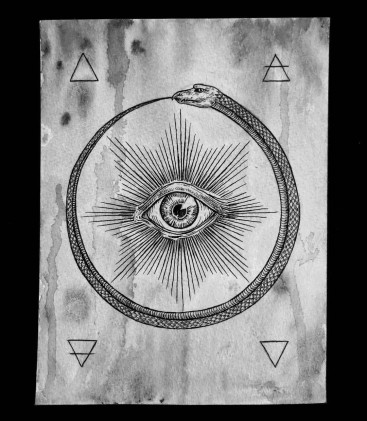
It
should be pointed out that Nietzsche definitely did not believe in
actual reincarnation. This idea of eternal recurrence is just a thought
experiment to determine a person’s fundamental attitude to life. The
question is how someone reacts to the mere thought of this situation.
This is where the partial truth enters. It can sometimes seem nice to
fantasize about editing our lives; taking out all the boring bits, and
the suffering and the times we acted badly. But saying yes to life is
accepting it just as it is. However, what the test of eternal recurrence
misses is embracing development; the striving part. Living the same
life over and over would be a kind of hell because a person would never
get to develop. A good life combines development and acceptance. In
abandoning development, it is Nietzsche who is rejecting an important
aspect of life.
Suffering is fine, as far as it goes. Suffering is a motive to
change, to grow and develop. New parents must develop new capacities for
patience or end up abandoning or murdering their new baby. However, the
kind of suffering Nietzsche is recommending – never learning from your
mistakes and thus never developing, is hell. Developing does not mean
the end of suffering. Old problems are solved and new developmentally
appropriate ones replace them. There are the problems of youth, of
mid-life, and of old age; getting an education and useful skills at one
point, managing a household at another, and finding a way of having a
fulfilling retirement at yet another.
Acceptance is a virtue. We should accept two year olds, for all their limitations. They
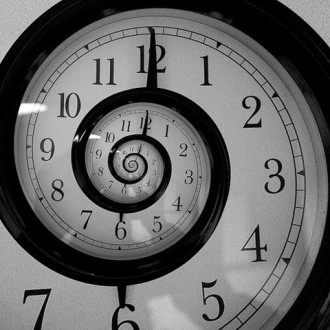
cannot
read, or write; they may not even be toilet trained, but they may
still be a perfect little two year old. We are all at some level of
development and are perfect in this way too. But loving that two year
old also means not condemning them to the same mistakes, the same
interests, the same level of cognitive development for all eternity. In
some sense, we are all that two year old. By trying to say yes to life,
Nietzsche says no to life.
What does Nietzsche see in nature? No morality. The strong eat the
weak. It is brutal, but it is the way it is. For Nietzsche, morality
says no to life. Morality tries to uplift the weak, it says that lending
a helping hand is the moral thing to do.. Nietzsche argues that
morality says no to life, to nature. Any attempt to change these basic
facts of life is to say no. We must say yes, and saying yes means
accepting everything. Nature is on the side of the strong, so we should
be too.
Those driven by excessive compassion, Agape, are sometimes attracted
to Nietzsche’s nonjudgmental acceptance. Fans of Eros can admire
Nietzsche’s emphasis on strength, independence, and the self-reliance in
this image of things, where a person is not looking for handouts or
support from others.
In reality, Nietzsche’s view even of nature is inaccurate. “Nature”
features animals working together for mutual survival, both prey and
predator. Mother lions, birds, pandas, wildebeest, etc. care for and
nurture their young. It is not all unrelieved brutality.
There is a certain type of smart, young person who thinks that
accepting total nihilism is manly and admirable. Any deviation from
unrelieved awfulness is mere escapism and fantasy. Ivan Pavlov wrote:
“There are weak people over whom religion has power. The strong ones –
yes, the strong ones – can become thorough rationalists, relying only
upon knowledge, but the weak ones are unable to do this.”
[2]
Since rationalism can only analyze, but not create value, beauty, and
love, only the weak, in this view, will avoid nihilism. In addition,
Pavlov falsely assumes that empiricism produces knowledge but that
philosophical and religious speculation do not. Near unanimous agreement
about the trivial is often possible, while important truths remain
debatable, and this provides the opportunity for human creativity,
imagination, intuition, and freedom.
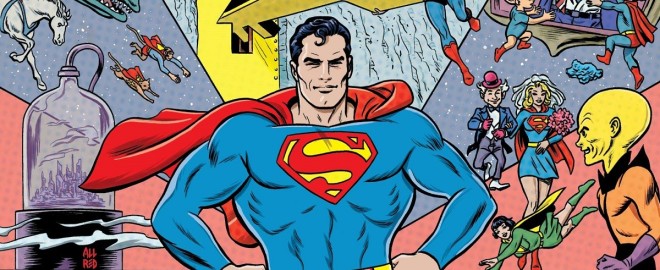
Evidence of Nietzsche’s acknowledgement of the horror of what he is
arguing and his willingness to accept this horror can be seen in his
comments about Indian “untouchables;” the lowest members of the Indian
caste system. They can wear only used clothing. They may not wash in
fresh water because they would pollute it. They may drink only from the
water that fills where the muddy hoof print of an animal like an ox has
fallen. Nietzsche pretends to delight in this, after going into graphic
disgusting detail. Cultural relativism, that instance of idiot
compassion, would acquiesce to this. “This is the Indian way, we must
not judge.” Unconditional acceptance. And paradoxically, this attitude
might be attractive to lovers of excessive Eros, seeing the untouchables
as the weak who get what they deserve.
Nature, Nietzsche thinks, says yes to “master” morality while
Christian charity is keeping mankind down. Nietzsche claims that Kant
celebrates mediocrity and bourgeois virtues like punctuality as though
that they are the peak of human achievement. If mankind is to achieve
anything, Nietzsche thinks, it must leave the heaving masses behind and
the true genius must rise above the petty self-protective whining of hoi
polloi. The Übermensch will prevail.
Callicles, that Platonic character who inspired Nietzsche, might be
right that generally the many, the weak, are fans of “justice” as
law-abidingness because laws against stealing, violence, and murder
protect the vulnerable more than those able to defend themselves. Their
motives are often selfish, not moral. The weak hope for protection under
the law, and value charity because they hope to be its recipients.
Much of the time their apparent love of morality is just self-interest.
This may well be true. But their selfish motives do not mean that
kindness, charity, and laws, are wrong. It is possible to love genuinely
good things for the wrong reasons.
Nietzsche, the diabolical saint of acceptance tries to accept
everything as a consequence of unconditional love. But when he tries to
accept Nature, he finds a charnel house of death and destruction, the
strong consuming the weak. Out of love and compassion he will send the
weak to the gas chambers and deny their pleas for help because in not
accepting their fate, the weak are rejecting life. They must be shown
the light. Those who seek to protect the weak he regards as the
naysayers.
One senses, at times, Nietzsche’s reluctance to keep following this
line of thought. He is going to overcome his disgust at brutality in a
heroic act of acceptance. It is his idiot compassion that leads him to
embrace ruthless domination and name Napoleon as a
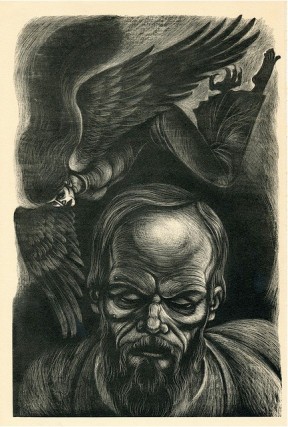
hero.
Like some kind of wannabe savior, Nietzsche takes on the weight of the
world. In his desire to supplant God and Jesus and to get people to
embrace godlessness, Nietzsche strongly resembles Dostoevsky’s character
Kirillov in
The Devils, also known as
The Possessed.
Both become the rivals of God and Christ. They will save us from
salvation, unredeem redemption and promise us eternal death. To do this,
we must embrace our own nothingness and give up dreams of the divine;
except the transcendental vision remains intact because to do this would
be an immense overcoming. Nietzsche and Kirillov are grandiose in their
aspirations and retain strong intimations of religiosity. Zarathustra
is a prophet after all. They are as god-fixated as any theist.
Apparently, Kirillov confused critics because he has many of the same
virtues as Dostoevsky’s Christ-like Prince Myshkin in
The Idiot. But Dostoevsky did this to show that truly demonic behavior can arise from the best of intentions.
Kirillov points out that the major draw card of religions is the
promise of eternal life. No billionaire can offer such a thing. Kirillov
hopes to overcome the fear of death through his suicide. If death is
not to be feared, then religion becomes that much less attractive.
Kirillov is in competition with Christ. Nietzsche is too and in fact is
quite indignant about his inferior status. It seems likely that now, at
least for some people, Nietzsche is indeed to be preferred to Christ.
Nietzsche can be compared to a naïve well-meaning undergraduate moral
relativist. Relativism is taught to school children to teach them to be
tolerant. Students will at times attempt to tolerate some of the
greatest horrors ever perpetrated by mankind in order to be good people.
They too, like Nietzsche, strive to be saints of acceptance and they do
so by holding their noses and attempting to embrace slavery and the
Holocaust. It is, however, evil to tolerate evil. Apparently, some of
the children’s teachers who promulgated this rot actually promote this
kind of thinking.
Nietzsche can at times be an excellent psychologist and aphorist. His
claim that each person’s philosophy is a kind of self-confession is
trenchant. He was right to be horrified by John Stuart Mill and
utilitarianism, and by Kant, to a much lesser degree. However, he shared
their rejection of Christian morality and imagined, like them, that he
could improve upon it – but his beyond-man, his Übermensch, never did
arise and produce new solely self-created values. Nietzsche’s
naturalistic metaphysics precludes the attribution of value or the
discovery of it. God is the source of all values. Without him, there is
nihilism; nothing. The materialist and atheist Karl Marx also tried to
supplant Christianity, but just borrows Christian compassion and
charity, but distorts it by making it compulsory. Goodness only exists,
is only good, if it is free.
Nietzsche finds some appropriate targets of nineteenth century
bourgeoise morality and Christianity to criticize but does not come
close to finding any alternative. At the most, Nietzsche can be seen as a
truth-seeker and someone willing to accept unpleasant realities, but in
the end his philosophy fails amid a mass of contradictions.
[1] Many truths are partial, but some more damagingly so than others.


 and
are thus connected with eternity, God, and Freedom that the Person has
supreme intrinsic value. There simply is no way around this fact.
Nietzsche, on the other hand, is famous for the notion that God is dead.
This is usually understood to mean that God is dead as a cultural
phenomenon; that all the smart people have become atheists. René Girard
argues in Dionysus Versus the Crucified, however, that this is a
misunderstanding and that the truth is far more complicated. Nietzsche
rejected Christianity in favor of a return to pagan religion and
Dionysus. Dionysus is a trickster god who stirs up trouble, encourages
his own murder by challenging the social hierarchy, only to magically
reappear unharmed afterwards. This is because Dionysus represents the
scapegoat who is falsely blamed for generating a complete social
breakdown in a way that only a god could achieve, who is then murdered,
bringing the community together in shared hatred, unanimity minus one,
and is then credited with creating widespread peace, again in a god-like
manner.
and
are thus connected with eternity, God, and Freedom that the Person has
supreme intrinsic value. There simply is no way around this fact.
Nietzsche, on the other hand, is famous for the notion that God is dead.
This is usually understood to mean that God is dead as a cultural
phenomenon; that all the smart people have become atheists. René Girard
argues in Dionysus Versus the Crucified, however, that this is a
misunderstanding and that the truth is far more complicated. Nietzsche
rejected Christianity in favor of a return to pagan religion and
Dionysus. Dionysus is a trickster god who stirs up trouble, encourages
his own murder by challenging the social hierarchy, only to magically
reappear unharmed afterwards. This is because Dionysus represents the
scapegoat who is falsely blamed for generating a complete social
breakdown in a way that only a god could achieve, who is then murdered,
bringing the community together in shared hatred, unanimity minus one,
and is then credited with creating widespread peace, again in a god-like
manner.  The Bacchae
by Euripides, “Bacchus” being another name for Dionysus, depicts the
threatening, implacable, and undefeatable nature of the scapegoating
dynamic. Dionysus, a long-haired beautiful and effeminate youth, has a
reputation for stirring up the Bacchae, the female followers of Bacchus,
into a mad murderous frenzy that would likely include wild drinking.
Pentheus, the king of Thebes, wants nothing to do with Dionysus and
tries to eject him from the city but, failing that, ends up imprisoning
him. Dionysus warns Pentheus that he will be sorry for interfering with a
god, an earthquake sets Dionysus free from his prison, and everything
goes to hell for Pentheus who loses his head, literally, at the hands of
his own mother who has become one of the bacchants.
The Bacchae
by Euripides, “Bacchus” being another name for Dionysus, depicts the
threatening, implacable, and undefeatable nature of the scapegoating
dynamic. Dionysus, a long-haired beautiful and effeminate youth, has a
reputation for stirring up the Bacchae, the female followers of Bacchus,
into a mad murderous frenzy that would likely include wild drinking.
Pentheus, the king of Thebes, wants nothing to do with Dionysus and
tries to eject him from the city but, failing that, ends up imprisoning
him. Dionysus warns Pentheus that he will be sorry for interfering with a
god, an earthquake sets Dionysus free from his prison, and everything
goes to hell for Pentheus who loses his head, literally, at the hands of
his own mother who has become one of the bacchants. resentment,
that unlovely emotion and attitude, but it is better than the strong’s
treatment of the weak. Repressed violence is better than violence
expressed.
resentment,
that unlovely emotion and attitude, but it is better than the strong’s
treatment of the weak. Repressed violence is better than violence
expressed. Thus Spake Zarathustra
is where Nietzsche announces the death of God and has the prophet claim
that we have murdered him with our bloody knives. Girard points out
that this is simply not taken seriously by many critics who imagine that
he is referring to the Christian God and that the reference to knives
is strictly metaphorical. But it is Dionysus the god, the scapegoat
victim, that we kill with our knives whereupon he is resurrected as
immortal savior, to begin the process all over again.
Thus Spake Zarathustra
is where Nietzsche announces the death of God and has the prophet claim
that we have murdered him with our bloody knives. Girard points out
that this is simply not taken seriously by many critics who imagine that
he is referring to the Christian God and that the reference to knives
is strictly metaphorical. But it is Dionysus the god, the scapegoat
victim, that we kill with our knives whereupon he is resurrected as
immortal savior, to begin the process all over again.


 It
should be pointed out that Nietzsche definitely did not believe in
actual reincarnation. This idea of eternal recurrence is just a thought
experiment to determine a person’s fundamental attitude to life. The
question is how someone reacts to the mere thought of this situation.
This is where the partial truth enters. It can sometimes seem nice to
fantasize about editing our lives; taking out all the boring bits, and
the suffering and the times we acted badly. But saying yes to life is
accepting it just as it is. However, what the test of eternal recurrence
misses is embracing development; the striving part. Living the same
life over and over would be a kind of hell because a person would never
get to develop. A good life combines development and acceptance. In
abandoning development, it is Nietzsche who is rejecting an important
aspect of life.
It
should be pointed out that Nietzsche definitely did not believe in
actual reincarnation. This idea of eternal recurrence is just a thought
experiment to determine a person’s fundamental attitude to life. The
question is how someone reacts to the mere thought of this situation.
This is where the partial truth enters. It can sometimes seem nice to
fantasize about editing our lives; taking out all the boring bits, and
the suffering and the times we acted badly. But saying yes to life is
accepting it just as it is. However, what the test of eternal recurrence
misses is embracing development; the striving part. Living the same
life over and over would be a kind of hell because a person would never
get to develop. A good life combines development and acceptance. In
abandoning development, it is Nietzsche who is rejecting an important
aspect of life. cannot
read, or write; they may not even be toilet trained, but they may
still be a perfect little two year old. We are all at some level of
development and are perfect in this way too. But loving that two year
old also means not condemning them to the same mistakes, the same
interests, the same level of cognitive development for all eternity. In
some sense, we are all that two year old. By trying to say yes to life,
Nietzsche says no to life.
cannot
read, or write; they may not even be toilet trained, but they may
still be a perfect little two year old. We are all at some level of
development and are perfect in this way too. But loving that two year
old also means not condemning them to the same mistakes, the same
interests, the same level of cognitive development for all eternity. In
some sense, we are all that two year old. By trying to say yes to life,
Nietzsche says no to life.
 hero.
Like some kind of wannabe savior, Nietzsche takes on the weight of the
world. In his desire to supplant God and Jesus and to get people to
embrace godlessness, Nietzsche strongly resembles Dostoevsky’s character
Kirillov in The Devils, also known as The Possessed.
Both become the rivals of God and Christ. They will save us from
salvation, unredeem redemption and promise us eternal death. To do this,
we must embrace our own nothingness and give up dreams of the divine;
except the transcendental vision remains intact because to do this would
be an immense overcoming. Nietzsche and Kirillov are grandiose in their
aspirations and retain strong intimations of religiosity. Zarathustra
is a prophet after all. They are as god-fixated as any theist.
Apparently, Kirillov confused critics because he has many of the same
virtues as Dostoevsky’s Christ-like Prince Myshkin in The Idiot. But Dostoevsky did this to show that truly demonic behavior can arise from the best of intentions.
hero.
Like some kind of wannabe savior, Nietzsche takes on the weight of the
world. In his desire to supplant God and Jesus and to get people to
embrace godlessness, Nietzsche strongly resembles Dostoevsky’s character
Kirillov in The Devils, also known as The Possessed.
Both become the rivals of God and Christ. They will save us from
salvation, unredeem redemption and promise us eternal death. To do this,
we must embrace our own nothingness and give up dreams of the divine;
except the transcendental vision remains intact because to do this would
be an immense overcoming. Nietzsche and Kirillov are grandiose in their
aspirations and retain strong intimations of religiosity. Zarathustra
is a prophet after all. They are as god-fixated as any theist.
Apparently, Kirillov confused critics because he has many of the same
virtues as Dostoevsky’s Christ-like Prince Myshkin in The Idiot. But Dostoevsky did this to show that truly demonic behavior can arise from the best of intentions.